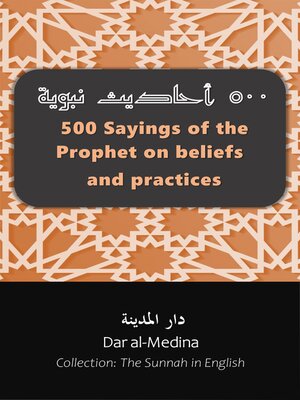500 Sayings of the Prophet on beliefs and practices
ebook ∣ Collection: the Sunnah in English
By Dar al-Medina (English)

Sign up to save your library
With an OverDrive account, you can save your favorite libraries for at-a-glance information about availability. Find out more about OverDrive accounts.
Find this title in Libby, the library reading app by OverDrive.



Search for a digital library with this title
Title found at these libraries:
| Library Name | Distance |
|---|---|
| Loading... |
In these times of widespread attacks against Islam and its prophet, but also against his followers, it became urgent to give voice to Muhammad, peace and blessings be upon him. For if some aphorisms of Jesus are well known in the West, sometimes even turned into proverbs such as the expression: "No man is a prophet in his own country", who in our country is able to quote a single word of the prophet of Islam? However, Muslim traditionalists have compiled them into hundreds of collections that include tens of thousands of these words called "hadith".
The hadith, therefore, refers to a word - or, more rarely, to an act of the Prophet or his tacit approval - communicated by one of his companions. The content of the hadith collections is thus similar to that of the four Gospels, which record the words and deeds of Jesus, except that the plan of the Gospels follows the course of Christ's life, whereas the hadith collections are generally classified by subject matter.
However, there is a major difference between the hadith collections and the Gospels: the "chain of transmission". While we do not know the lives of the four evangelists, Matthew, Mark, Luke and John, let alone those who transmitted their texts to us, each hadith comes to us with a list of the men who transmitted it, from the companion who heard it from the mouth of the Prophet to the one who recorded it in his collection.
One of the particularities of Islam is, in fact, what is known as "hadith sciences", which study the authenticity of a given hadith by analyzing the probity and rigor of the various persons who contributed to its transmission. If one person is missing in the chain, or if one of the reporters lacks probity or rigor, the hadith is rejected.
The best known hadith collections are those of al-Bukhari (810-870) and Muslim (817-875), whose authenticity is unanimously accepted by Muslims to the point that it can be said that al-Bukhari and Muslim are to Muslims what Matthew, Mark or Luke are to Christians. In other words, their works are the gospel for them. Therefore, in order to present the reader with the most authentic traditions, we have drawn essentially from these two collections the hadiths proposed here. In addition, we have taken a number of traditions from the works which, in terms of authenticity, immediately follow al-Bukhari and Muslim, namely the collections of Abū Dawūd, Tirmidhi, Ibn Majah, Nasai, and Imam Ahmad. These seven hadith compilations are today considered by Muslim scholars to be the most accurate and reliable.







